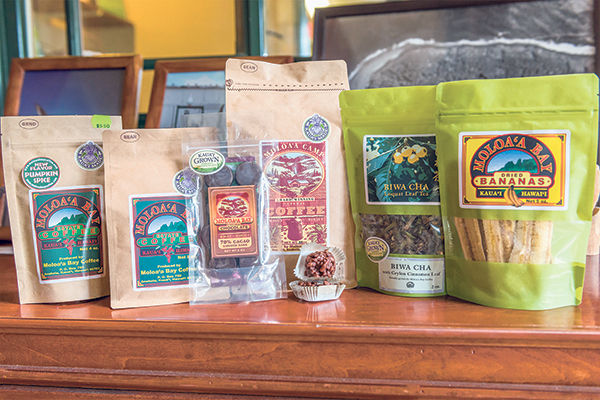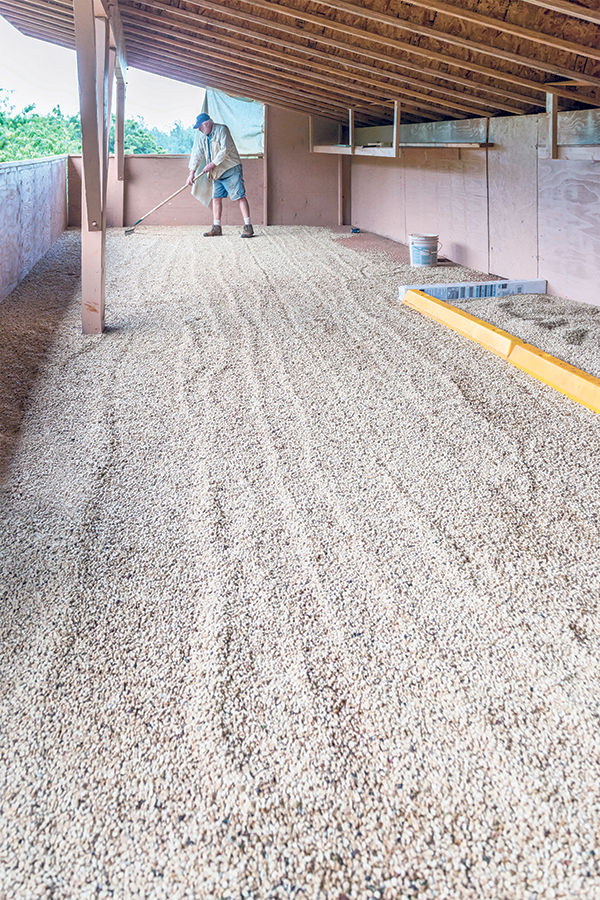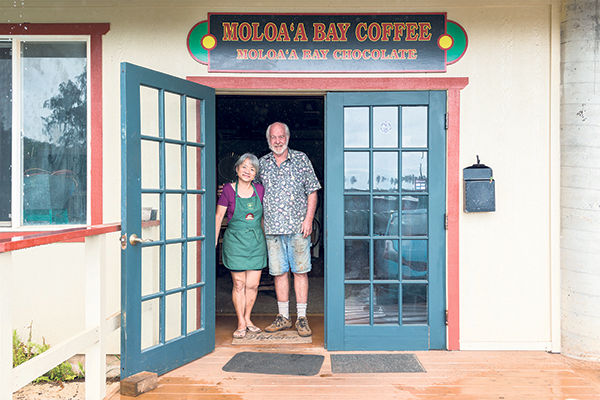Moloaa Bay Coffee is a 15-acre farm that was established in 1998. The farm is situated on a cliff over Moloaa Bay and during the fall and winter months, the sound of crashing waves reverberates throughout the orchard. Owners John
Moloaa Bay Coffee is a 15-acre farm that was established in 1998. The farm is situated on a cliff over Moloaa Bay and during the fall and winter months, the sound of crashing waves reverberates throughout the orchard.
Owners John and Daphne McClure grow Typica natural coffee, apple bananas, cacao and loquat. These items are harvested and processed into value-added products. Their family-run business sells coffee, keshir tea, dehydrated apple bananas, chocolate bars and loquat tea.
Coffee
Moloaa Bay Coffee is a single-origin estate coffee, which means the coffee isgrown within a single known geographical origin and the beans come from one farm. A common industry practice is to blend coffee from different geographical regions and estates. One example is the Kona coffee blends, which are promoted as Kona coffee, but only contain 10 percent Kona coffee beans. The rest may come from Brazil, Colombia, Indonesia, Vietnam and/or Mexico, among others. Single origin and estate coffees that are produced on small family farms are a rare, and therefore more expensive, product.
During peak season, 10 people — including John, Daphne and their daughter Amber — hand pick perfectly ripe coffee cherries from trees on six acres. Over the weekend of Nov. 8, 2,000 pounds were harvested. In 2013, they picked 20,000 pounds of coffee cherries.
Once picked, the pulp is separated from the bean and those 20,000 pounds turn into 5,000 pounds of coffee.
When processing, Moloaa Bay Coffee uses what is known as the “washed process.” Washed coffees are generally characterized as clean, bright and mild in flavor. After cherries are harvested, they’re washed and loaded into a de-pulping machine. Coffee cherries are sliced open and two beans are pushed out.
Beans are fermented before they dry on a covered patio for about three days, until their moisture content reaches about 11 percent. The bean’s innermost layer is called parchment, and this is left on until they are ready for roasting. This thin skin enables green (unroasted) coffee beans to store for many years. Just before roasting, the parchment is removed in a process called milling.
Moloaa Bay Coffee roasts beans at their new retail shop in Kapaa. Five flavors, which are available in whole bean or ground and cost $11 for 8 ounces, include: regular; dark roast; decaffeinated; vanilla macadamia nut; and chocolate macadamia nut.
Keshir tea
Coffee cherry tea, also known as keshir tea, is a staple of Yemeni cuisine, which is extremely popular among the Arab States of the Persian Gulf. Around 1,100 years ago, coffee was brought to Arabia, today’s Yemen. Making tea from the coffee berry husks enabled these long-ago farmers to sell lucrative coffee crops, while enjoying the natural byproduct for free. Traditionally, the hot drink is spiced with ginger and cinnamon.
Today, keshir tea is attractive to health and wellness seekers for its nominal caffeine levels and outstanding antioxidant properties. Other health benefits include increased metabolism and immune support. Keshir tea is a good source of manganese, iron, vitamin B6 and potassium.
Moloaa Bay Coffee’s Kauai Keshir Tea costs $6 for 4 ounces and is available in three flavors: cinnamon and spices; chai; and lilikoi.
Chocolate
About 14 years ago, John and Daphne planted their first cacao trees. They received them from Helen Ferris, who John says is the first person to grow cacao on Kauai. A field trial with the University of Hawaii prompted John to replace hundreds of the old varieties with new heirloom quality trees, which were provided by the Hawaii Agriculture Resource Center. Today, there are more than 1,000 trees planted on 2.5 acres.
“We are probably one of a few farms in the world that grows and makes their own single estate chocolate,” says John, who personally transforms the cacao beans into smooth and rich chocolate bars.
Loquat tea
Big leaves from six loquat trees are picked once a week, shredded, dried and bagged for tea. The trees were grown from donated seeds and the tea is only available at the retail store and farmers markets.
Loquat is indigenous to southeastern China and possibly southern Japan, where it has been cultivated for more than 1,000 years. Loquat leaves are widely used in traditional Chinese medicine.
According to Acupuncture Today, loquat leaves are considered bitter and cool, and are associated with lung and stomach meridians. Functions include phlegm expectorant, to clear lung heat and harmonize the stomach. Conditions treated by loquat leaves are bleeding, nausea, vomiting, belching, hiccups, and gastrointestinal distress. Loquat leaves can be used as part of a poultice to treat skin conditions such as eczema and skin ulcers.
According to Purdue University, an infusion of the leaves, or the dried, powdered leaves, may be taken to relieve diarrhea and depression and to counteract intoxication from consumption of alcoholic beverages.
Moloaa Bay Coffee products can be found at:
A new retail store opened in August at 943 Kipuni Way, Kapaa. Hours are 7 a.m. to 4 p.m., Monday through Friday. You can also meet the McClures and purchase their products at the Kauai Community Market at Kauai Community College (Saturdays 9:30 a.m. to 1 p.m.) and the Kauai Culinary Market at The Shops at Kukuiula (Wednesdays 3:30 to 6 p.m.) Online orders can be made at www.MoloaaBayCoffee.com.
•••
Marta Lane has been a Kauai-based food writer since 2010. After graduating from a 12-week organic farming course on the North Shore, she became the farm’s Community Supported Agriculture manager. Marta is the author of “Tasting Kauai: Restaurants — An Insider’s Guide to Eating Well on the Garden Island.” For more information, visit www.TastingKauai.com.




